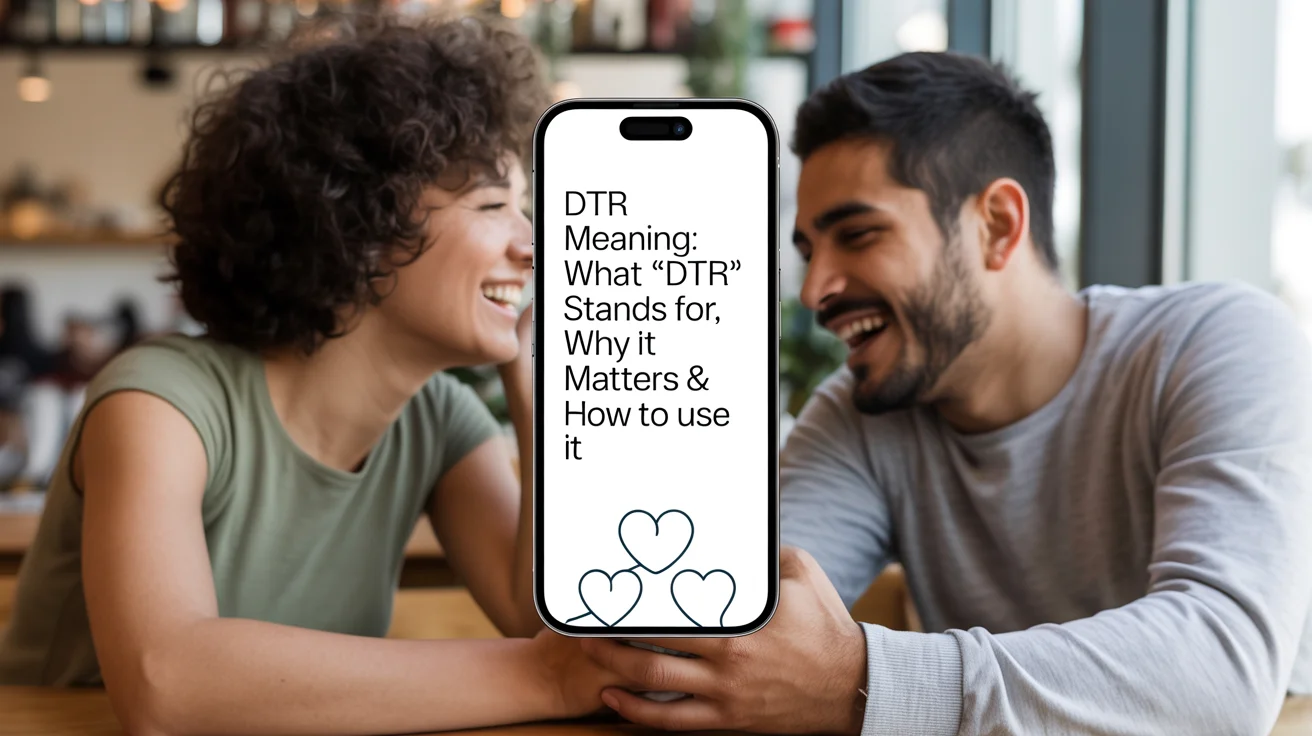In the age of emojis, acronyms, and endless texting, few terms capture modern relationship dynamics quite like “DTR.” You might’ve seen it pop up in a chat or heard someone mention it after a few dates: “We need to DTR.”
But what exactly does DTR mean in text? And more importantly — how do you know when it’s time to have the DTR talk?
This guide breaks down everything: the definition, why it matters, when to bring it up, and how to navigate the conversation confidently. Whether you’re texting someone new or defining a long-term bond, understanding DTR’s meaning can change how you approach love and communication.
What Does “DTR” Stand For?
At its core, DTR stands for “Define The Relationship.” It’s a conversation where two people clarify what they are to each other — exclusive partners, casual daters, or somewhere in between.
The Literal Definition
“DTR” = Define The Relationship.
It’s a modern shorthand used in both texting and speech, especially among daters navigating today’s digital romance landscape.
People use it when they’re ready to move past the “just talking” stage and want clarity about where things are heading. The phrase might appear as:
- “We need to DTR soon.”
- “Did you DTR with them yet?”
- “I think it’s time to have the DTR talk.”
The abbreviation saves words but carries emotional weight — it’s about commitment, honesty, and clarity.
Where “DTR” Appears in Conversation
You’ll commonly find DTR used in:
| Context | Example |
| Texting | “We’ve been going out for months… should we DTR?” |
| Social Media | “When you DTR and realize you’re both on the same page 😍” |
| Dating Apps | “Looking for something real — let’s DTR when the time’s right.” |
| Real Life | “We had the DTR talk last weekend, and now we’re official.” |
It’s become a part of digital slang, especially among Millennials and Gen Z, who use texting as the main form of emotional communication.
Other Meanings of DTR
While the most popular meaning is “Define The Relationship,” you might occasionally see DTR used differently in other fields:
| Field | DTR Meaning |
| Technology | Data Terminal Ready (a signal in serial communication) |
| Healthcare | Dietetic Technician, Registered |
| Religion | Determined To Rise (used in motivational contexts) |
Still, when you see it in a texting or dating scenario — it always means Define The Relationship.
Why “DTR” Matters in Modern Relationships
The world of dating has changed dramatically. Between social media, texting, and dating apps, many relationships exist in a “gray area.” You might hang out regularly, talk every day, and still not know — are we official?
That’s where the DTR talk comes in.
The Ambiguity Problem
Today’s dating culture thrives on mixed signals. Words like “talking,” “seeing each other,” “exclusive,” and “situationship” all mean different things to different people.
A 2023 Pew Research study found that 47% of online daters said it’s “hard to know when a relationship is exclusive.” This lack of clarity leads to confusion, unmet expectations, and emotional burnout.
By having a DTR conversation, couples bridge that communication gap and set mutual expectations before feelings get hurt.
What The DTR Talk Accomplishes
The DTR discussion isn’t just about labels — it’s about emotional safety. Here’s what it helps achieve:
- Clarity: You both know what the relationship is — no guessing.
- Honesty: Encourages transparency about wants, fears, and goals.
- Boundaries: Sets clear expectations around exclusivity and behavior.
- Direction: Helps you understand if the relationship is moving forward or standing still.
As dating coach Sarah Jones puts it:
“DTR talks aren’t ultimatums; they’re mutual check-ins that protect emotional investment.”
Why It’s More Relevant Now
In previous generations, relationships had clearer progression: date → court → become exclusive → marry.
Now, with online dating, “slow fades,” and “soft launches,” it’s easy to stay in limbo.
DTR has become a shorthand way to regain control — to ask, “Where do we stand?” in a world where ambiguity is often the default.
Risks of Skipping It
If you avoid the DTR talk, you might face:
- Mismatched expectations: One person thinks it’s exclusive; the other doesn’t.
- Emotional confusion: Mixed signals lead to stress and insecurity.
- Lost time: Investing months in someone who doesn’t share your goals.
- Resentment: Feeling misled when the relationship doesn’t evolve.
Having “the talk” may feel awkward, but clarity now prevents heartbreak later.
When To Have the “DTR Talk”
Timing is everything. Bringing it up too early can feel rushed, but waiting too long can leave you stuck in uncertainty.
Signs It Might Be Time To DTR
Here are a few telltale signs you’re ready for the Define The Relationship talk:
- You catch yourself wondering, “What are we?”
- You’ve stopped seeing other people.
- You’re emotionally invested but lack a label.
- You feel anxious about their intentions.
- Friends are asking, “Are you two official?”
If these resonate, it’s probably time to DTR.
The Right Timing
There’s no universal timeline — but most relationship experts agree that 4–8 weeks of consistent dating is a reasonable window.
It’s long enough to build chemistry but early enough to prevent misaligned expectations.
Case Study:
A 2024 survey by Elite Singles found that 68% of respondents prefer to DTR after dating someone for at least a month.
This shows people value emotional connection before making it official.
Cultural and Generational Differences
- Gen Z daters are more likely to use terms like “DTR” or “situationship,” normalizing open discussions about status.
- Older generations might frame it as “having the talk” without using the acronym.
- In some cultures, formal definitions happen later; in others, clarity is expected early.
Bottom line — the right time is when you want clarity and feel emotionally ready to have an honest conversation.
How To Actually DTR: A Practical Guide
Having the talk can feel nerve-wracking, but preparation helps. The goal isn’t pressure — it’s understanding.
Prepare Yourself
Before the talk, ask yourself:
- What do I want from this relationship?
- Am I seeking exclusivity or something casual?
- What am I willing to compromise on?
Be clear with yourself before you expect clarity from someone else.
Choose the Right Environment
Pick a comfortable, private space where you can talk openly — no distractions, no audience. Avoid bringing it up mid-argument or over text.
“You can’t DTR effectively between Netflix episodes,” says dating psychologist Dr. Rachel Hoffman.
“Make it intentional. It’s a conversation, not a confession.”
How To Start the DTR Talk
If you’re not sure how to phrase it, here are some natural ways to open:
- “I’ve really enjoyed spending time with you, and I’d love to know where we both see this going.”
- “We’ve been seeing each other for a while — how do you feel about what we have?”
- “I want to be clear about what I’m looking for so we’re on the same page.”
Avoid ultimatums like “Are we official or not?” Instead, focus on mutual understanding.
Topics To Cover During DTR
| Topic | Why It Matters |
| Exclusivity | Are you both dating only each other? |
| Labels | Do you consider each other partners, or still dating casually? |
| Future Direction | Are you both open to seeing where it goes, or seeking long-term commitment? |
| Boundaries | Clarify expectations around communication, social media, and priorities. |
Keep it conversational, not confrontational.
How To Handle Different Outcomes
If you’re aligned:
Celebrate! You’ve just built the foundation for a healthy relationship. Discuss what comes next — meeting friends, sharing social media updates, or just enjoying the new clarity.
If you’re not aligned:
It can sting, but at least you know where you stand. It’s better to know early than stay uncertain for months.
“Rejection gives you direction,” as relationship coach Matthew Hussey says.
“The DTR talk is about truth, not titles.”
If they’re unsure:
Give them space to think. You can revisit the conversation later, but don’t let it linger indefinitely.
Common Pitfalls & How To Avoid Them
Even with good intentions, people often stumble during the DTR process. Here are common mistakes and how to sidestep them.
Avoiding the Talk Out of Fear
Many people delay the DTR because they fear rejection. Ironically, that fear can lead to more pain later.
Tip: Reframe it as a step toward clarity, not confrontation.
Being Vague or Indirect
Statements like “We’re just seeing how it goes” can backfire. Ambiguity leaves both parties guessing.
Use direct, calm language like:
“I’m enjoying what we have, but I’d like to define it more clearly.”
Waiting Too Long
The longer you avoid clarity, the more emotionally complicated it becomes. Time doesn’t define a relationship — communication does.
Forcing It Too Soon
Pushing for a DTR talk after just a few dates can feel overwhelming. Make sure both people have had enough time to connect first.
Texting the DTR
While texting is convenient, tone often gets lost. Whenever possible, have this conversation face-to-face.
Read More: Green FN Meaning: Understanding Its Use, Alternatives, and Contexts
Language & Slang Around “DTR”
Modern dating is full of acronyms and slang that express relationship dynamics. Knowing them can help you decode your partner’s messages.
Related Acronyms
| Acronym | Meaning | Context |
| LDR | Long-Distance Relationship | For couples living apart |
| FBO | Facebook Official | Publicly announcing a relationship |
| BF/GF | Boyfriend/Girlfriend | Traditional labels |
| FWB | Friends With Benefits | Casual relationship |
| NSP | Not So Platonic | Flirty friendship |
| BAE | Before Anyone Else | Term of endearment |
Understanding these helps you see where DTR fits — it’s the bridge between casual and committed.
How People Use DTR in Text
Examples of DTR in text messages:
- “We need to DTR soon before things get confusing.”
- “Had the DTR last night — it went great!”
- “He tried to DTR way too early 😬.”
Tone depends on context — it can sound lighthearted or serious, depending on how you use it.
Cultural and Generational Differences
- Gen Z: Uses DTR casually, even humorously.
- Millennials: Treat it more seriously, as a milestone.
- Older Generations: Might not use “DTR,” but they still “have the talk.”
Slang evolves, but the underlying desire for clarity never changes.
After the DTR Talk: What Comes Next
The DTR conversation isn’t the end — it’s the beginning of a new phase in your relationship.
If You’re Aligned
If both of you agree on what you want:
- Discuss what exclusivity looks like for you.
- Talk about introducing each other to friends or family.
- Keep communication open as things evolve.
A DTR talk strengthens the bond — it builds trust, transparency, and shared direction.
If You’re Not Aligned
Don’t panic or take it personally. Some relationships serve a purpose even if they’re short-term. Use what you learned to make better choices next time.
“Clarity is kindness,” says therapist Nedra Glover Tawwab.
“Ambiguity keeps you stuck; truth sets you free.”
Ongoing Check-Ins
Relationships change. Revisit your DTR conversation periodically — every few months or when things shift. Healthy couples evolve together.
| Frequency | Purpose |
| Every 3–6 months | Revisit goals and expectations |
| After major life events | Adjust boundaries and needs |
| When issues arise | Realign communication and intentions |
FAQs About DTR Meaning
Q1: Is DTR only for romantic relationships?
No. While it’s most common in dating, people can DTR in friendships or even business partnerships when setting boundaries.
Q2: Can you DTR more than once?
Absolutely. Relationships evolve, and so should definitions. A follow-up DTR is healthy.
Q3: What if I DTR and they ghost me?
It’s painful, but revealing. Their avoidance gives you clarity — they weren’t ready for honesty.
Q4: Does DTR mean we’re exclusive?
Not necessarily. It’s about defining what exclusivity means to both of you — labels vary by couple.
Q5: Is it weird to bring up DTR via text?
Not weird, but risky. Tone matters. Use text to set it up (“Can we talk later about where we’re at?”), then have the conversation in person.
Conclusion
Defining the relationship — or DTR — isn’t about pressure. It’s about clarity, respect, and emotional honesty.
In a dating culture full of “almost relationships” and “situationships,” being direct is refreshing. Whether you’re ready to commit or just want to know where you stand, a DTR talk gives both people freedom — to move forward together or part ways with understanding.

Founder of PunnyPeeks and master of celebration magic, David Mass is the creative spark behind the brand’s bold, balloon-filled brilliance. With an eye for color, a flair for design, and a passion for making people smile, David transforms events into unforgettable experiences. From quirky puns to perfectly curated party decor, he believes that every occasion deserves a splash of fun and a whole lot of heart.




